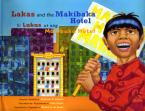Last year I wrote an editorial for my friend Gary on some of the good things about America - check out the article Counting Our Blessings or How I Can Say Something Good Too in the July 2005 newsletter. The supposed purpose of that editorial was to counter balance some of my more critical pieces on America and our government.
Gary's challenge to me this year was similar, but instead of speaking on general terms, he wanted me to be more specific and discuss some of the good that our government has done and is doing. He even sent me an editorial from the San Francisco Chronicle's website, entitled "Good news? U.S.-bashers aren't listening, Naysayers, foreign and domestic, ignore Meshket Turks' relocation," to get my writing juices flowing.
Here was part of my email reply to Gary in rebuttal to this abrasive Chronicle Editorial -
"It's a myth that all critics hate America and its government. I can't speak for others, but as for myself, I believe government has a vital role. I like hearing about the good things that the US does, but in context with all the other things it does too. I'm saddened when I hear about the bad things, but we can't stick our heads in the ground and ignore things that are going bad.
I can even stand having more government as long as it works well and is within the accords of our Constitution and the United Nation's Universal Declaration of Human Rights.
I belong to the percentage that feels that it is patriotic to speak up when you see the government doing things that are wrong and that need improvement or change. Being a critical observer is kind of like being a mortician - if that's what you do, it's sometimes hard to smile. People whose job it is to report things that are wrong are often viewed as downers or too negative about everything.
Yes, not enough is reported on the good things in life, but most activist probably figure it's not their job to do that."
Well for this editorial, I'll try to make it my job to highlight a few things that the government got right.
But First, Some Further Thoughts
On My Initial Reluctance to Doing this Editorial
I guess the reason for my apprehension for doing a "Positive" piece stemmed from my general impression that positive editorials and articles tended to be political spin. Wikipedia defines spin as -
"…signifying a heavily biased portrayal in one's own favor of an event or situation that is designed to bring about the most positive result possible. While traditional public relations relies more on creative presentation of the facts, "spin" often, though not always, implies disingenuous, deceptive and/or highly manipulative tactics to sway audiences away from widespread (and often commonsense) perceptions."
When I started to think about the aspects of "thinking positive" it reminded me of something I had read a long while ago that was partially based on the Zen Buddhist Second Noble Truth on the causes of suffering. Like Charles Dickens' warning in his story "A Christmas Carol," the Second Truth places the blame for suffering on "want" and "ignorance." Gee, I didn't realize until now, that Charles Dickens knew the ways of Zen :).
In any case, what I had read a long while ago was that positive thinking could be just as much of a problem as negative thinking if it distorts reality and keeps us ignorant. Real understanding and learning comes from having a clear vision of the problems at hand.
The way we evaluate something as being right and wrong or positive and negative often depends on ones point of view. People with full knowledge of the same facts can still have disagreements. However, the use of positive spin with the clear knowledge and purpose of being deceptive is totally unacceptable.
With that in mind, I bring you some of my sincere, non-deceptive spin, picks for positive government news stories of the year. Note - the following stories are in no particular order of importance and their inclusion in this list does not mean that I find them to be the best or most important positive news stories of this year.
Creation of the North Western Hawaiian Islands
National Marine Monument
On June 15, 2006, President Bush officially proclaimed the North Western Hawaiian Islands region as a National Monument. This region that will be protected is nearly the size of California and will be the largest protected marine area in the world. Many of the supporters of this action, including Hawaiians of all political stripes, had expected the region to be eventually protected as a national marine sanctuary. National Monument designation provides stronger and faster protection for this region.
If you're a commercial fisherman or other exploiter of this body of water and islands you may not find this to be a positive story, but the protection provided by this new National Monument designation is generally beneficial to us all. Environmental protection helps to support
|
biodiversity and biodiversity may be critical to our future survival on Earth.
The Kahea Hawaiian-Environmental Alliance, a leading supporter of this action, has a list of articles pertaining to this story on their website.
New Generic AIDS Pill Approved
By the FDA to Treat Third World People
On July 6, 2006 the New York Times reported that the FDA approved the first 3-in-1 antiretroviral pill for use by the American-sponsored international plan for AIDS treatment. This single pill, which contains three drugs that are commonly used to treat HIV/AIDS patients in the United States, is specifically target for the treatment of HIV/AIDS patients in Africa and Vietnam.
After the May 2003 passage of "United States Leadership Against HIV/AIDS, Tuberculosis and Malaria Act of 2003," the President's Emergency Plan for AIDS Relief (PEPFAR) was created. Under this act, a good portion of the $15 billion/five year plan was to be spent on AIDS treatment. However any drugs purchased for this plan, even though the recipients were out of the country, had to meet FDA approval.
It was originally feared that PEPFAR money would go to purchase expensive US manufactured medicines instead of generics that may be made elsewhere. Purchases of the more expensive medicines would mean that fewer people could get treated through this program. FDA approval of this generic drug, which is manufactured in India, may mean that many more people will be treated. In addition, a single pill treatment might also mean better adherence to the drug dosing regiment needed to keep AIDS at bay.
Not only is the proper treatment of HIV/AIDS afflicted people in other countries beneficial to these individuals, it also may mean the slowing of mutations of the AIDS virus (resulting from the improper usage of drugs) which is important to all the people of the world. On an economic level, AIDS treatment is important to reversing the downward economic trends of countries that have lost large portions of their most productive populace. Good economic conditions around the world may also lead to fewer wars and strife.
Hamdan vs. Rumsfeld
The following is taken directly from the Wikipedia.org website summary of this case.
Hamdan v. Rumsfeld, 548 U.S. ___, 126 S.Ct. 2749, (2006), is a case in which the Supreme Court of the United States held that military commissions set up by the Bush administration to try Guantanamo detainees were illegal.
The case specifically considered whether the United States Congress has the authority to pass legislation preventing the Supreme Court from hearing the case of an accused combatant before his military commission takes place, whether the special military commissions that had been set up violated federal law (including the Uniform Code of Military Justice and treaty obligations), and whether courts can enforce the articles of the 1949 Geneva Convention.
On June 29, 2006, the Court issued a 5-3 decision holding that it had jurisdiction, that the federal government did not have authority to set up these particular special military commissions, and that the special military commissions were illegal under both the Uniform Code of Military Justice and the Geneva Convention.
This is a pretty complex and controversial Supreme Court decision that would easily require a large amount of time to explain. The online encyclopedia Wikipedia.org does a good job explaining all the details of the case, but the David Cole article in the NY Review of Books does an excellent job of explaining why this should be on a positive list of things that our government (the US Supreme Court) has done in the past year. David Cole's explanations of the decision are very accessible even to non-legal experts. So please read this article at http://www.nybooks.com/articles/19212 (especially before you send any argumentative replies :).
Here is an excerpt of the conclusion to David Cole's article -
"The Hamdan decision confirms not only that all three branches have a role to play, but that international law itself has an essential role, in particular the laws of war that the administration has for so long sought to evade...
making US practice conform to the international rules that formally reflect world opinion is a necessary first step if we are to begin to reduce the unprecedented levels of anti-American sentiment found among our allies and foes alike, and offset the propaganda advantage our unilateral approach has given to al-Qaeda....
both the strength and security of the nation in the struggle with terrorists rest on adherence to the rule of law, including international law, because only such adherence provides the legitimacy we need if we are to win back the world's respect. Hamdan suggests that at least one branch of the United States government understands this."
Wish I had time for more, but I want to get this to you before July ends.
|




